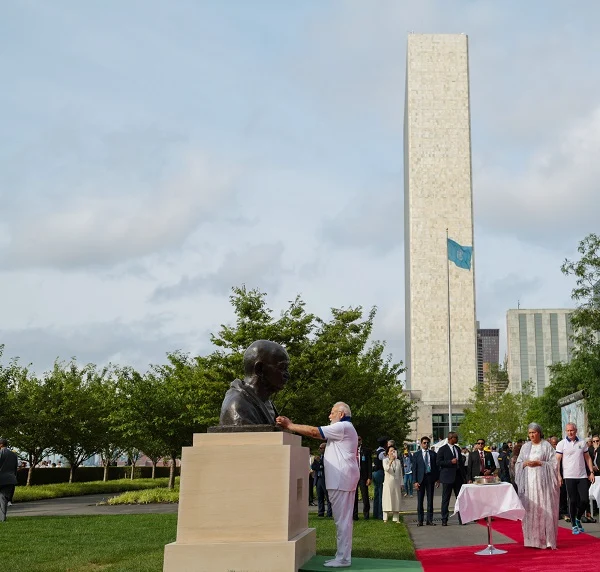

Prime Minister Narendra Modi at the UN Headquarters, New York in June this year (File image courtesy: PIB)
India on Friday reminded Pakistan that it should first put its own house in order before pointing a finger at the world’s largest democracy.
The strong response came after Pakistan’s interim Prime Minister Anwaar-ul-Haq Kakar raked up Kashmir issue out of nowhere at the annual United Nations General Assembly (UNGA) debate in New York on the benefits and risks of digital revolution.
Speaking in exercise of the right of reply, Petal Gahlot, India’s first secretary at United Nations for second committee of UNGA, slammed Pakistan calling the country a “habitual offender” in misusing the august forum to pedal “baseless and malicious” propaganda against India.
“Member States and other multilateral organisations know it does so to deflect international attention from its own abysmal record of human rights,” said Gahlot.
The Indian diplomat drove home the point that the union territories of Jammu and Kashmir and Ladakh are an integral part of India and that it is high time that Pakistan should stop interfering in India’s internal affairs.
Islamabad, she stated, should rather be focused on confronting serious challenges at home.
“For example, Pakistani women that are part of minority communities face very poor conditions, and they are the victims of abduction,” mentioned Gahlot adding that Pakistan should put its own house in order before pointing a finger at the world’s largest democracy.
It is not for the first time that Pakistan has tried to distort reality and portray a false picture of the challenges in the region.
India, having pointed out several times that Islamabad is actually a victim of its own policies of breeding and sponsoring terrorists, has lambasted Pakistan’s “venomous comments” over several decades.
Asserting that no amount of rhetoric can deny the reality, New Delhi has maintained that the Union Territories of Jammu and Kashmir and Ladakh are an inalienable part of India, including the part of Jammu and Kashmir currently under the illegal occupation by Pakistan.
Pakistan, however, continues to choose international forums to propogate its false and malicious propaganda as a distraction from the debate’s theme.
“The desire for peace, security and progress in the Indian subcontinent is not only real but also widely shared. It can be realised when cross-border terrorism ceases, governments come clean with the international community and their own people, minorities are not persecuted and such realities are recognised before meetings,” India said during a UN Security Council meeting, earlier this year.
As India continues to get World support against the Pahalgam Terror attack that killed 26…
Union Minister of Industry and Supply Piyush Goyal on Saturday highlighted the success of a…
In a display of outrage following the Pahalgam terror attack, thousands from the Indian community…
In a continued crackdown following the Pahalgam terror attack, security forces and Jammu and Kashmir…
In a massive statewide crackdown, over 550 illegal immigrants from Bangladesh were detained in Ahmedabad…
The Deputy Chief of the Main Operations Directorate of the General Staff of the Russian…